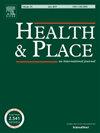妇女经期经历的知识、态度和支持:乌干达坎帕拉男性的横断面调查
IF 3.8
2区 医学
Q1 PUBLIC, ENVIRONMENTAL & OCCUPATIONAL HEALTH
引用次数: 0
摘要
月经在公共卫生研究中受到越来越多的关注,特别是在学校的青少年中。然而,很少有研究涉及成年男性。这一次要分析(1)评估了男性对女性月经习惯的看法与女性实际做法之间的一致性;2)研究了男性人口统计学特征与他们对月经相关沟通规范的看法之间的关系;3)评估了男性对这些规范的看法是否与他们对家庭中月经期妇女或女孩的支持有关。横断面数据于2022年在乌干达坎帕拉通过家庭调查从男性(n = 344)和女性(n = 297)中收集。结果是关于在公共场合和在男性面前讨论月经是否合适的两个规范问题。我们使用了泊松回归和费斯回归的组合。家庭中有月经来潮的人与男性认为在男性面前讨论月经是可以接受的观念呈正相关(PR: 1.37;95% ci: 1.07, 1.76;p & lt;0.01)或在公共场合(PR: 1.12, 95% CI: 1.12, 2.46;p & lt;0.01)。支持规范与支持行为相关;同意女性可以在公共场合和男性面前讨论月经的男性更有可能报告愿意与女性谈论与月经有关的问题(PR = 1.75, 95% CI: 1.38, 2.22;p & lt;0.001)。我们的研究结果支持需要改变规范,以减少讨论月经的耻辱感。旨在改善月经健康的计划应该考虑男性对月经的了解,他们在月经周围的家庭环境中的角色,以及规范如何有助于他们在家庭中支持月经者。本文章由计算机程序翻译,如有差异,请以英文原文为准。
Knowledge, attitudes, and support of women's menstrual experiences: A cross-sectional survey of men in Kampala, Uganda
Menstruation has received growing attention in public health research, particularly among adolescents in schools. However, fewer studies have engaged adult men. This secondary analysis (1) assessed alignment between men's perceptions of women's menstruation practices and women's actual practices; 2) examined associations between men's demographic characteristics and their perception of menstruation-related communication norms, and 3) assessed if men's perceptions of these norms are associated with their support of menstruating women or girls in their household.
Cross-sectional data were collected via household survey from men (n = 344) and women (n = 297) in Kampala, Uganda in 2022. Outcomes were two norms questions on the appropriateness of discussing menstruation in public and in front of men. We used a combination of Poisson and Firth's regressions. Presence of a menstruator in the household was positively associated with men's perception that it is acceptable to discuss menstruation in front of men (PR: 1.37; 95% CI: 1.07, 1.76; p < 0.01) or in public (PR: 1.12, 95% CI: 1.12, 2.46; p < 0.01). Supportive norms were associated with supportive behaviors; men who agreed that women may discuss menstruation in public and in front of men were more likely to report a willingness to talk to women about menstruation-related problems (PR = 1.75, 95% CI: 1.38, 2.22; p < 0.001). Our findings support the need for norms change to reduce stigma around discussing menstruation. Programs aiming to improve menstrual health should consider men's knowledge of menstruation, their role in the household environment around menstruation, and how norms may contribute to how they support menstruators in their households.
求助全文
通过发布文献求助,成功后即可免费获取论文全文。
去求助
来源期刊

Health & Place
PUBLIC, ENVIRONMENTAL & OCCUPATIONAL HEALTH-
CiteScore
7.70
自引率
6.20%
发文量
176
审稿时长
29 days
期刊介绍:
he journal is an interdisciplinary journal dedicated to the study of all aspects of health and health care in which place or location matters.
 求助内容:
求助内容: 应助结果提醒方式:
应助结果提醒方式:


